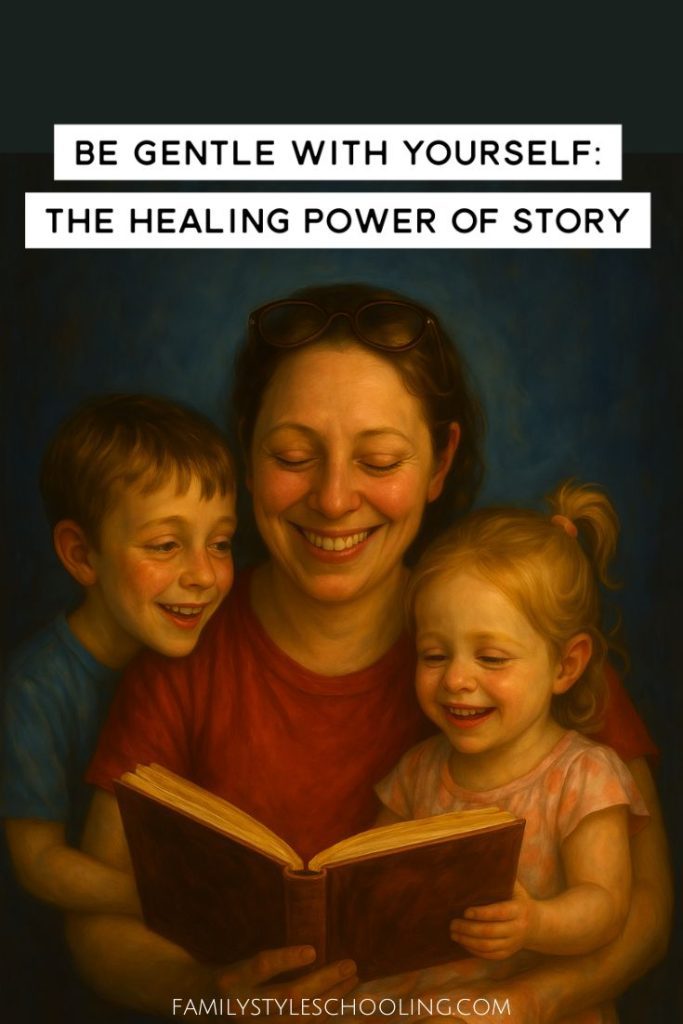Be Gentle With Yourself: The Healing Power of Story
Healing doesn’t happen all at once. It comes slowly, sometimes quietly, like morning light creeping across the floor. And if there’s one thing I’m still learning, it’s this:
You have to be tender with yourself on the journey.
Whether you’re grieving someone you love, carrying the ache of a broken relationship, or trying to untangle the wounds of childhood—you are walking sacred ground. And sacred ground requires gentleness.
For me, one of the most unexpected gifts in my own healing has been story. Telling it. Writing it. Reading it. Watching it unfold on screen. Stories make space for what’s too heavy to carry in silence. They help us name what hurts and imagine what could be. They remind us we’re not alone.
We Become the Stories We Tell Ourselves
There are stories I’ve told myself that kept me small. Stories that said, “You should be over this by now.” Or, “You’re too sensitive.” Or, “It’s your fault they left.” These are not the voice of the Good Shepherd. They are the echoes of old pain.
But when I began to tell the truth, something shifted. When I sat down and wrote out what actually happened—and how I felt, even if it was messy—I began to breathe again.
We become the stories we tell ourselves. So we need to become better storytellers.
Not by changing the facts, but by letting God rewrite the meaning. By letting Him meet us inside the memories we’ve tried to forget and show us that He was there all along.
The Power of Narrative Therapy (Even If You’re Not a Therapist)
You don’t have to be a counselor to find healing through narrative. You just need a little courage and some quiet space.
Try writing a memory—not to fix it, but to see it more clearly. Let the pain come to the surface without judging it. And then, when you're ready, ask Jesus, “Where were You?”
His presence won’t always change what happened. But it will change how you carry it.
You can also try this with a trusted friend…or even with a tool like ChatGPT. I’ve had surprising moments of breakthrough simply by reflecting with someone—or something—that helps me pause, notice patterns, and tell the story in a more grace-filled light.
When we share our stories with someone who will hold them tenderly, we start to loosen shame’s grip. We begin to see ourselves with compassion. That’s where healing begins.
Stories That Help Us Heal
Sometimes the most powerful stories are the ones we don’t write—but receive.
Reading a novel where a character struggles with grief can crack something open in your own heart. Watching a film where someone finds belonging after feeling invisible can be a balm you didn’t know you needed. These stories don’t have to be overtly Christian to be redemptive. Healing often hides in unexpected places.
For me, movies like Little Women have brought tears that felt like prayer. Books like The Giver or The Book of the Dun Cow have helped me name deep things I didn’t have language for yet.
Sometimes, watching someone else’s story reminds us that our own is not over.
Telling a Better Story
What if part of your healing is learning to tell your story with kindness?
Not by skipping the hard parts, but by tracing the thread of redemption. By noticing the moments you survived, the people who showed up, the flickers of beauty in the ashes. That’s not pretending. That’s reclaiming.
We don’t need to tidy everything up into a neat ending. But we can begin to see our lives through the lens of hope. Because the Author of our story is not finished yet.
You’re Not Alone
If you’re in a tender season right now—grieving, aching, remembering—I just want to say: be gentle with yourself.
Take your time. Write what you can. Cry when you need to. Ask questions. Read stories that make you feel seen. Talk to someone safe. Invite Jesus into the pain—not to erase it, but to sit with you in it.
He’s not in a rush. He’s not ashamed of your sorrow. He walks at the pace of healing, which is usually slower and softer than we expect.
And as you walk, may you begin to tell your story—not from fear or shame, but from a place of grace.
You are not too much. You are not too late.
Your story matters. And it’s still being written.
🌿 Healing through Storytelling
These books may not all be labeled “Christian,” but they reflect Kingdom truths—restoration, identity, and the beauty that can come from brokenness.
For Grief and Letting Go:
- A Grief Observed by C.S. Lewis – In this raw and unfiltered reflection, C.S. Lewis lays bare the depth of his sorrow after the death of his beloved wife. More journal than theology, this short book captures the honest questions, aching silence, and flickers of hope that often accompany deep grief. It’s a sacred companion for anyone walking through loss, offering the comfort of being seen in the struggle without rushing to resolution.
- Hannah Coulter by Wendell Berry — A tender, contemplative novel told through the voice of an aging woman looking back on a life shaped by love, war, loss, and the quiet beauty of belonging. Set in the small farming town of Port William, Hannah’s story is rich with memory, grief, and the sacredness of ordinary days. This book is a gentle companion for anyone processing loss or wondering how to hold both sorrow and gratitude in the same breath.
- The Book of the Dun Cow by Walter Wangerin Jr. – A richly layered allegorical tale that explores grief, leadership, spiritual warfare, and sacrificial love—all through the unlikely lens of talking animals. Both whimsical and deeply profound, this story follows Chauntecleer the rooster as he wrestles with the burden of protecting his community from encroaching evil. In the midst of sorrow and struggle, grace appears in surprising ways. A powerful read for those processing loss, identity, or calling, especially when the weight of the world feels heavy.
🌿 Gentle & Healing Young Adult Books
(For processing grief, identity, or simply learning how to hope again)
💚 The Secret Garden by Frances Hodgson Burnett
A classic tale of healing through nature, friendship, and found family. Mary Lennox’s transformation mirrors how love and care—both given and received—can restore even the most closed-off hearts.
⚓️ Carry On, Mr. Bowditch by Jean Lee Latham
A beautifully written story of quiet determination, grief, and intellectual curiosity. Nat’s journey through loss and self-education is deeply inspiring and encourages purpose through hardship.
🕊️ Bridge to Terabithia by Katherine Paterson
Heartbreaking and healing, this story gently walks through the grief of sudden loss and the power of imagination and friendship to bring light to the darkest places.
✨ A Long Way from Chicago and A Year Down Yonder by Richard Peck
These stories blend humor and heartache through the lens of quirky Grandma Dowdel. Set during the Great Depression, they reflect themes of resilience, grief, and intergenerational healing.
🍃 The War That Saved My Life by Kimberly Brubaker Bradley
A young girl evacuated during WWII finds a new home—and healing—from childhood trauma. Gritty but redemptive, and filled with tender moments of trust and transformation.
🌺 Because of Winn-Dixie by Kate DiCamillo
A gentle story about loneliness, grief, and the unexpected healing that comes through a dog, a community, and honest storytelling. Sweet and surprisingly deep.
🕯️ The Hiding Place by Corrie ten Boom
True story. While not traditionally YA, it’s often read by teens. Corrie’s account of surviving the Holocaust is filled with unimaginable sorrow—but also with hope, forgiveness, and the nearness of God in suffering.
📖 Esperanza Rising by Pam Muñoz Ryan
A lyrical novel about a young girl forced to start over after personal loss. It tenderly portrays grief, resilience, and the quiet strength that comes from choosing gratitude and perseverance.
🐚 Tuck Everlasting by Natalie Babbitt
Philosophical and gentle, this story invites deep questions about life, death, and what makes our time here meaningful. A soft and poetic reflection on the gift of mortality.
Betsy Strauss is an unexpected homeschooler, mother of three, who is in a relationship with a sweet man for life. She loves reading books, drinking coffee, and learning anything with her kids.


